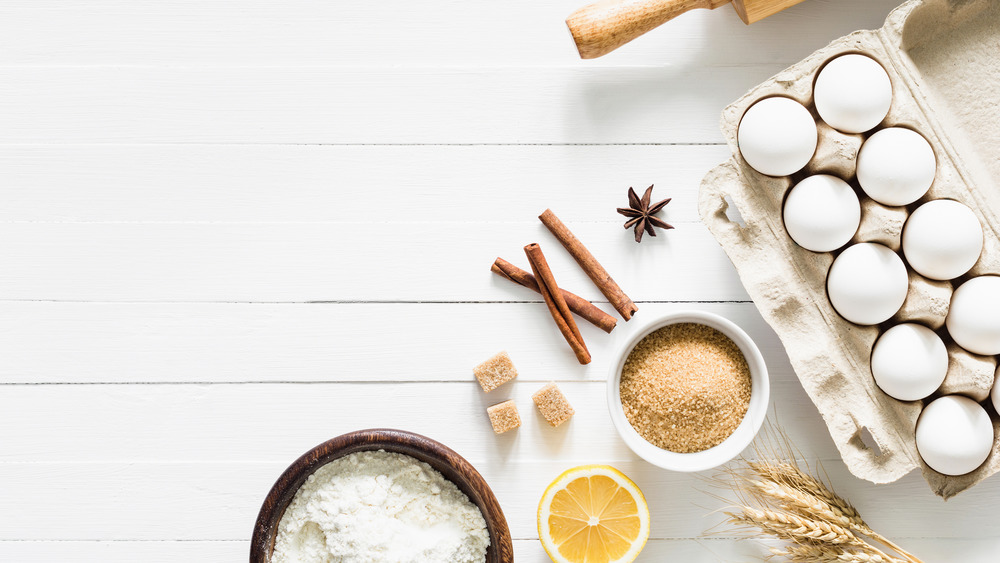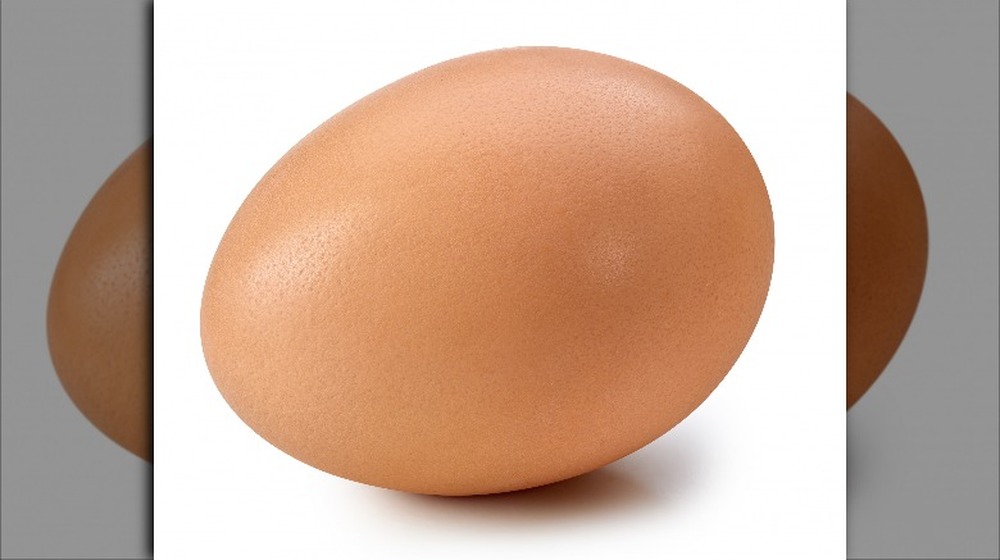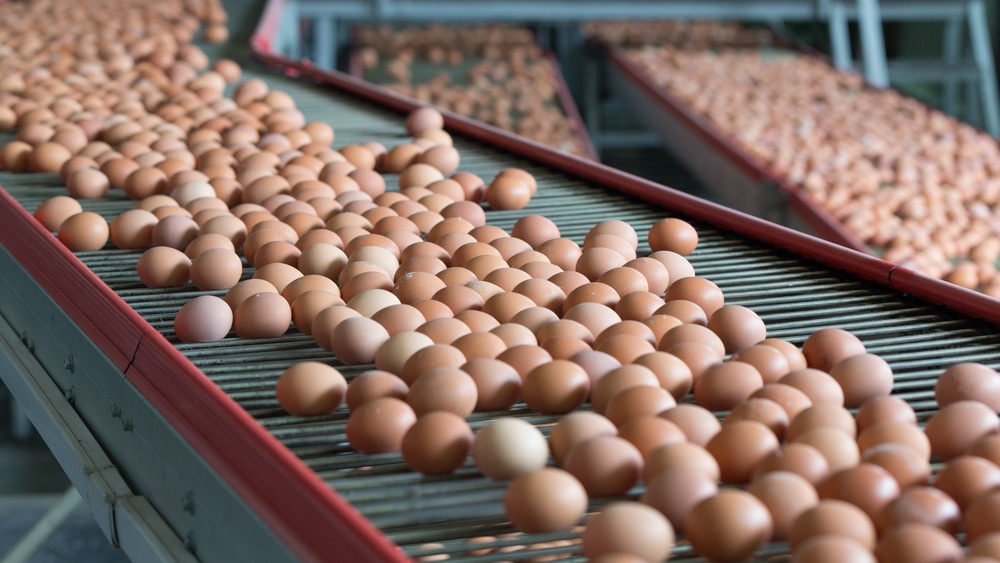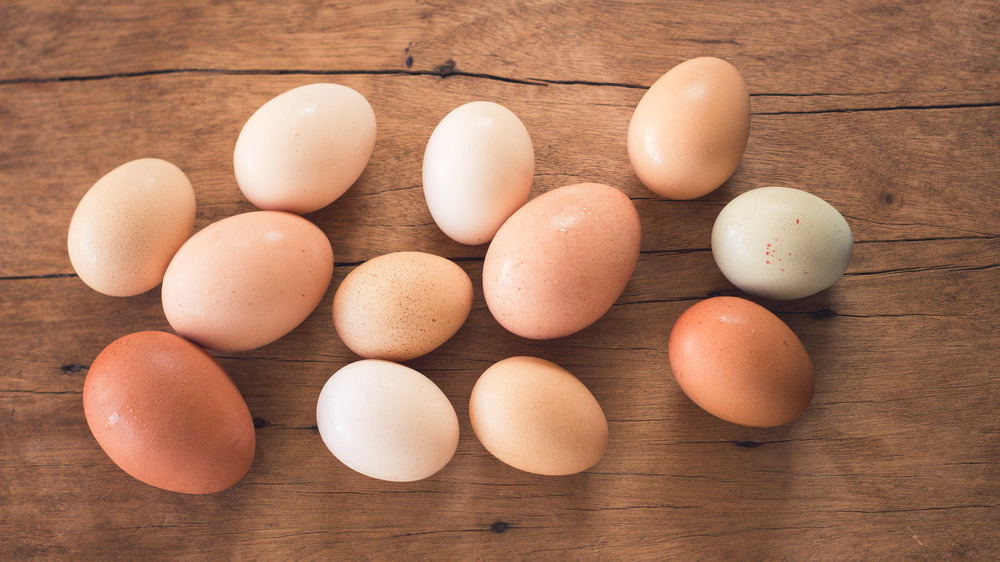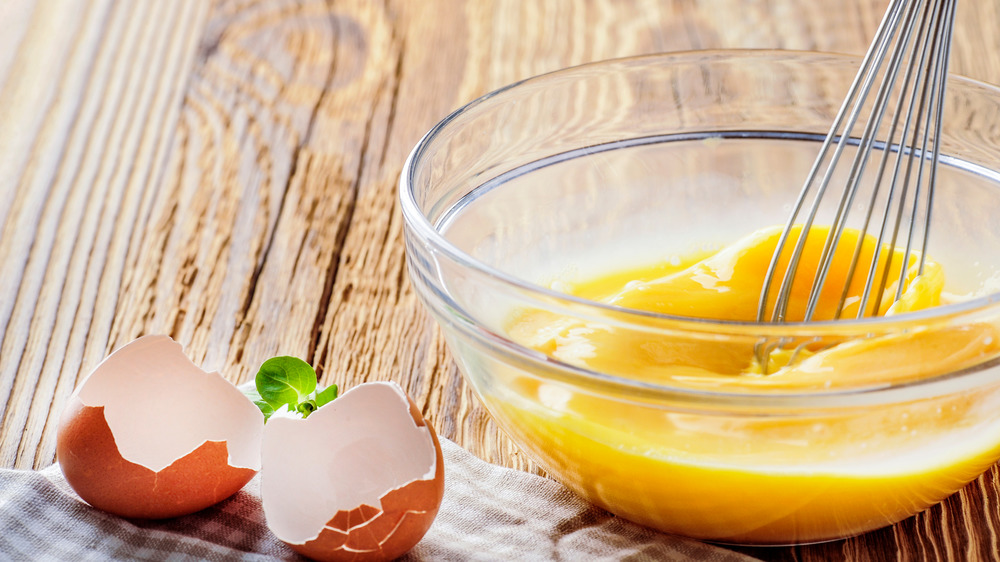The Crucial Thing You Never Think About When Baking With Eggs
Many recipes for baked goods calls for eggs, unless, of course, it's a vegan recipe, in which different types of egg substitutes may be deployed with varying results. Assuming you're sticking to more traditional recipes, however, you already know to have a carton of eggs on hand before you begin baking. Eggs provide leavening, structure, flavor, and even a little color (the last one, of course, does not apply to angel food cake, macaroons, macarons, or any other egg white-only recipe), and they also add some liquid.
One thing about eggs that's important to keep in mind: When they're used in baking, size really does matter. While it might not be a big deal if you make an omelet out of jumbo eggs instead of large or medium ones, Jocelyn Drexinger, the baker at Nellie's Free Range egg farm and owner of Mint and Mallow bakery, says: "Baking is a science that often does not leave much room for error, so we always want to be exact in our measurements, and this includes eggs." She explains that using a different-sized egg than the one called for in a recipe can alter the ratio of egg to other ingredients, and that's usually a recipe for disaster.
When in doubt, always use large
But what if the recipe doesn't say what size of egg to use? Drexinger reveals that "the vast majority of baking recipes are developed using large eggs," telling us, "that's what you should always use when a recipe doesn't specify the size." She goes on to say, " in my two decades of extensive baking experience, I have come across only a small handful of recipes that call for an egg size other than large," and acknowledges that most recipes actually do not specify egg size since it's assumed to be common knowledge that you should always use a large-sized egg.
If you didn't know, though, don't feel silly. Assumptions aren't always correct, especially now that it's far less common for schools to offer domestic science, home economics, or whatever other types of classes that teach practical life skills like cooking. Anyway, now you do know that large eggs = default eggs, so when you're egg shopping, it's best to stick to buying this size, at least if you often use eggs in baking as well as omelets (or omelettes).
What can happen if you use the wrong size egg?
Drexinger says that using the wrong size egg in a recipe will lead to noticeable differences in flavor and texture, but that these will be most significant with "higher egg-count recipes such as cakes or custards" where using too much or too little egg will upset the proper ratio of wet to dry. As a result, she says, " the taste will become unbalanced, and the structure of your product will suffer as well."
If the problem is too little egg, such as using medium where large would have been called for, Drexinger says in cakes this "will lead to a poor rise and denser, coarser crumb," while cookies made with not enough egg can be dry, crumbly, and not spread properly. A custard with insufficient egg could be lacking in flavor and fail to set. If, on the other hand, you over-egg the pudding, as the old idiom would have it, your pudding (or custard) will be rubbery and overly eggy-tasting. Too much egg also makes cookies turn out cakey and spread too much, while cakes with an excess of egg will be spongy, rubbery, and prone to collapse.
How can you swap one size of egg for another?
If you've got the wrong size eggs on hand, you can still use them to bake your recipe of choice, but you'll need to take a few extra steps to make sure you've got the proportions correct. Drexinger tells us, "there are a number of conversions you can use to make sure you have the correct liquid to dry ratio." She says if you're baking a recipe that calls for just one egg, you can probably get away with a medium, an extra-large, or even a jumbo egg in place of one large egg.
If the recipe calls for two large eggs, you can still swap out large for medium or extra-large, but if you've got jumbo eggs, use just one of these plus one (jumbo) egg white. For three large eggs, use three medium plus a tablespoon of water, three extra-large (no additions necessary), or two jumbo eggs plus a jumbo white. For four large eggs, swap five medium, four extra-large (again, a one-on-one swap here), or three jumbo eggs plus one tablespoon of water.
The best way to substitute egg sizes involves measuring
A much better way to substitute eggs is based on volume measurement. This also will allow you to use duck eggs in your baking if you're so inclined, plus it's a lifesaver if you've gotten into the whole "city chicken" thing and come to the realization that eggs don't pop out of chickens all neatly labeled L, XL, Jumbo, and so on. (They don't necessarily come out all nice and clean, either, but that's something best not dwelt on unless you were planning to convert to veganism anyway.)
"The most accurate conversion," Drexinger tells us, " involves whisking a few eggs together to blend the whites and yolks evenly." She suggests whisking one more egg than the number the recipe calls for if your eggs are on the too-small side and the same amount of eggs if the ones you've got are too large. You should then ideally use a kitchen scale to measure the correct amount of egg: 50 grams for each large egg. She says this method also works if eggs are separated, with each large egg white equivalent to 35 grams of whisked white and each yolk coming in at 15 grams. If you don't have a kitchen scale, Drexinger says, "you can also measure the whisked eggs in a measuring cup, using 1/4 cup of the blended liquid eggs to replace each large egg in your recipe."
